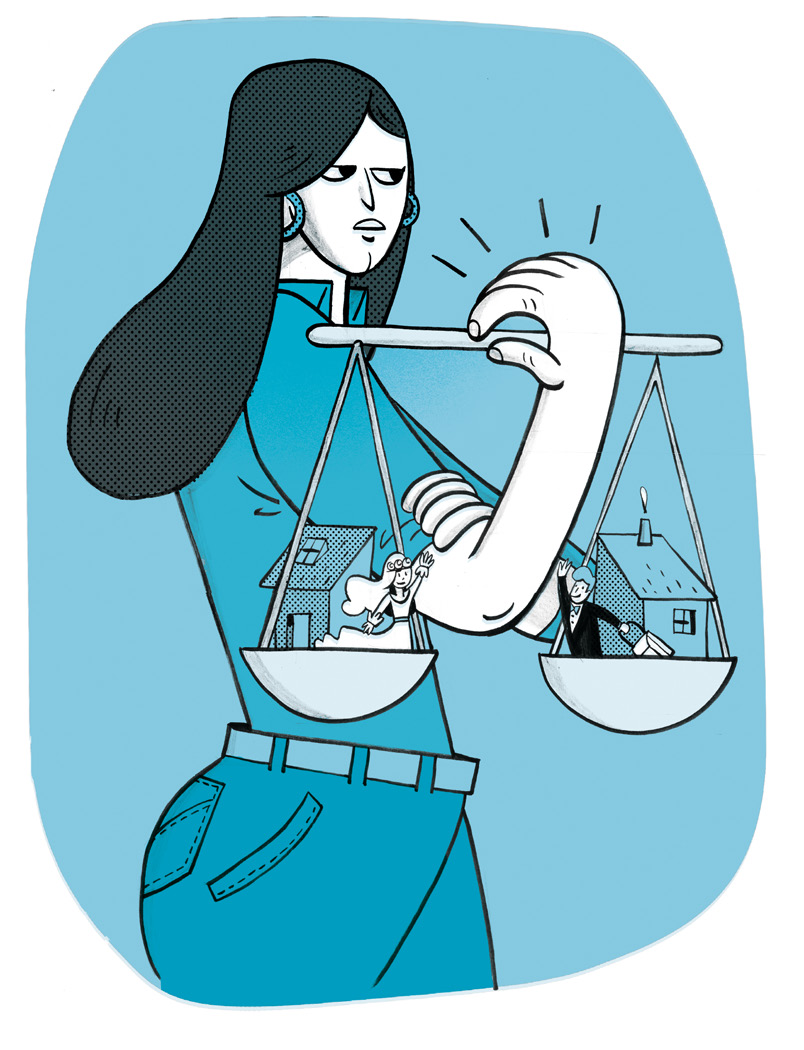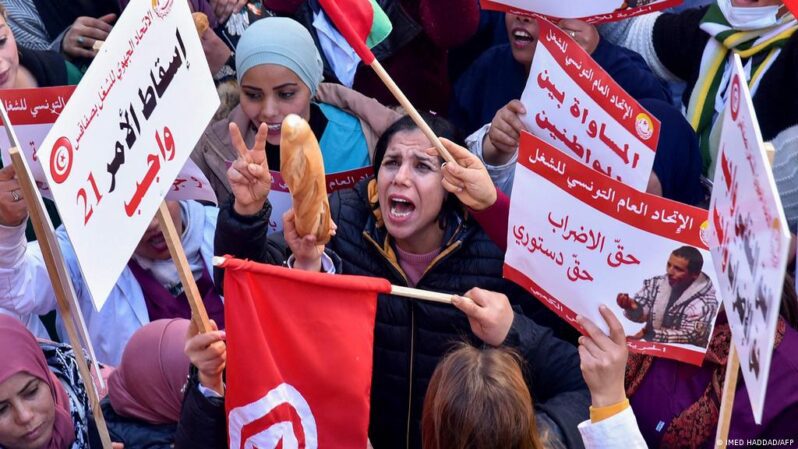Tunisian MP Yamina Zoghlami: Jurisprudence Must Protect Society

Editor’s Note: Several figures of the Tunisian Ennahdha party, headed by chairman of the Islamic Movement Rached Ghannouchi, have adopted an advanced discourse on individual freedoms. This discourse included Ghannouchi's refusal to criminalize homosexuality. In 2015, he publicly stated so to French journalist Olivier Ravanello in an interview for a book called “On the Subject of Islam”. On February 24, 2017, Lutfi Zaitoun, one of the most prominent members of the Ennahdha Shura Council, took the same stance in a statement to “Le Point”, in which he decriminalized homosexuality and the consumption of marijuana. However, statements of this kind are usually given to Western newspapers for many reasons, including avoiding confrontation with the locally-prevalent conservative discourse. In an exclusive interview, Ennahdha affiliate and MP Yamina Zoghlami talks to The Legal Agenda about her opinion regarding homosexuals and their rights. Zoghlami is a veteran politician with a track record of defending human rights. After chairing the Committee for Martyrs and Revolution Victims, she is now an active deputy in the Tunisian Parliament. She has contributed to laying the foundations for the transitional justice process and has recently participated in the enactment of the law criminalizing violence against women. Zoghlami answers some questions about legislative work in Tunisia, the transitional justice process, and individual freedoms.
The Legal Agenda: What is your assessment of the legislative work of 2017?
Zoghlami: I think that during the 2016-2017 parliamentary term, we succeeded in enacting important laws that significantly developed the corpus of Tunisian legislative human rights. Such laws include the Basic Law on the Prevention of and Combat Against Human Trafficking[1] and the Basic Law on the Elimination of Violence Against Women.[2] What I want to draw attention to is that this success should not overshadow the difficulty of translating these developments into a tangible reality, which is needed for a legislative revolution [in human rights]. This has not happened yet. Only when law enforcement authorities, particularly the judiciary and security, act in accordance with human rights values in theory and practice [will this transformation be achieved]. There is a need to reform these institutions. This reform already started with the establishment of the Supreme Judicial Council. There is also a need to impose control on all parties that prohibit any violations affecting the human rights system. Within the scope of evaluation of the Legislative Council’s performance of 2017, I say that the Council’s oversight work is very limited. This dereliction is not due to a poor performance on the part of MPs, but to the poor resources available for this work.
The Legal Agenda: With regard to parliamentary performance, how do you assess MP’s exercise of their role in the legislative initiative?
Zoghlami: MPs submitted a significant number of bills. Unfortunately, these draft laws did not receive due attention by parliament for reasons pertaining to the legislative workload which prioritizes governmental legislative initiatives. I would like to mention that Ennahdha, with which I am affiliated, submitted around ten draft laws including a significant number that supports the human rights system and develops social justice.
The Legal Agenda: Speaking of Ennahdha, the question that is always raised in this regard concerns the problem of Islamism and the values of human rights where you, as a political party, are accused of obstructing Tunisia's incorporation into the international system of human rights. What is your take on this issue?
Zoghlami: The political regulation which was issued by Ennahdha’s tenth conference in 2015 states that “the Ennahdha movement is a civil party that abides by the Constitution and the laws of the state”. Thus, we stress that the laws need to be reviewed pursuant to the Constitution and international covenants. Those who accuse us of not doing so overlook the fact that members of the Ennahdha were victims of the worst forms of aggression, torture, and deprivation. Only those who lived through this suffering know its worth. We experienced the absence of freedom. We therefore believe that the ceiling of freedom in Tunisia should not be limited. In my opinion, the problem is that some topics have been classified as taboo that are not so in Islam. The status of homosexuals is one example. For decades, Islamic schools of interpretation neglected to develop new jurisprudence on the subject. There are topics that need to be developed in Islam in order to keep up with the course of life without prejudice to religion and its basic rules. I believe in jurisprudence in many areas. We should recognize that homosexuals are present in Tunisia and all over the world. In this context, the state must protect them and their rights so they won’t be sexually exploited when they have no family, state, or law to protect them from any aggression. In Islam, we have the jurisprudence of priorities, and the priority today is to protect society and its people.
In conclusion, I should note that Western countries were a haven for the Ennahdha activists in the dictatorship era. These countries are the same ones that carry the torch of freedoms and rights globally, and we hope that the Ennahdha movement will carry that torch in Tunisia.
The Legal Agenda: What is your assessment of the path that transitional justice has taken so far?
Zoghlami: We have succeeded in enacting a transitional justice law catered to Tunisia but in line with international standards. Had the Truth and Dignity Commission handled the process properly, the path would have been a success especially since the largest bloc in parliament was defending this process, despite all the accusations to the contrary. The success of public hearings is a milestone. They enabled Tunisian society – especially this generation – to somewhat experience second-hand the transgressions we suffered in the dictatorship eras.
The Legal Agenda: Are you saying that the Truth and Dignity Commission gets a negative evaluation despite the success of public hearings?
Al-Zoghlami: Unfortunately, this commission did not perform well and in a manner that would encourage a healthy democratic transition. It did not complete its main tasks. In fact, I was personally surprised by the position of its president, Sihem Bensedrine. How could she imagine that she would be deposed by the chairmanship of this commission and by a decision from the Ennahdha? I visited her and gave her all the guarantees. I also sent her an on-air message during a radio interview saying that the Ennahdha calls on the Truth and Dignity Commission and its president to merely complete the transitional justice course, while I emphasizinged that the movement extends its support.
In reality, the parliamentary majority represented by the Ennahdha, Nidaa Tounes, and the government that emerged from it, spared no budget in supporting the Truth and Dignity Commission. In addition, the commission has access to the full security/police archive necessary to complete its work. Despite all that, there is a great deal of negligence on its part. I think that the commission’s president had all the mechanisms, personal qualities, and a personal history of struggle to lead this path successfully, yet she failed to send letters of reassurance to all those concerned with transitional justice. I also notice that the commission’s own Arbitration and Reconciliation Committee is one of the areas where the commission is most vulnerable, especially in light of the ambiguity surrounding its work.
The Legal Agenda: You accuse the commission of dereliction of duty in dealing with transitional justice, but what about the same accusations leveled against you in relation to the “list of martyrs and wounded of the Revolution”?
Zoghlami: When I was the chair of this committee, I became aware of the size of the major obstacles placed by several political parties and some segments of civil society that hampered the progress of this issue. As a result, we could not properly interact with the wounded and families of the martyrs. Unfortunately, this did not take a national dimension and was not independent from political strife. The Ennahdha party defended this issue the most, and suffered as a result from a number of accusations. Some of these accusations claimed that should reparations or financial damage be granted, the movement’s affiliates would benefit the most. I have now returned to the Committee of Martyrs and Wounded of the Revolution as a rapporteur, and we will reopen the file and ask the Truth and Dignity Commission – chairperson and members – what they did regarding this file.
The Legal Agenda: You have held part of the Tunisian civil society today responsible for hampering the process of addressing the issue of martyrs and wounded. What is your overall assessment of its performance?
Zoghlami: We have an observer civil society In Tunisia, exercising its oversight tasks effectively. Civil society also contributes to delivering information to politicians and executive authority. It also holds accountable those responsible for any incident in which rights or freedoms have been infringed. However, the negative aspect is that there is a double discourse in the Tunisian human rights field. For example, those who defend homosexuals’ rights should also defend veiled women’s rights to education and work. There are those who justify denying this category of their freedoms and rights, saying that the Tunisian state today is fighting terrorism. Nonetheless, although there are many veiled women accused of terrorist cases, they should be held accountable according to the law, instead of placing everyone in the same basket and justifying discrimination and denial of rights. A human rights activist must distinguish between their ideological affiliation and their actual work. The human rights dimension must prevail over belief and ideas, for it has a clear path that includes everyone without exception.On the other hand, we also need to review the Law on Associations and Political Parties with regard to the issue of funding.
This article is an edited translation from Arabic
Keywords: Ennahda, transitional justice, Yamina Zoghlami, homosexuality, women’s rights
_______________________________________
[1] Basic Law No. 61 of 2016 on the Prevention of and Combat Against Human Trafficking, dated August 3, 2016.
[2] Basic Law No. 58 of 2017 on the Elimination of Violence Against Women, dated August 11, 2017.



